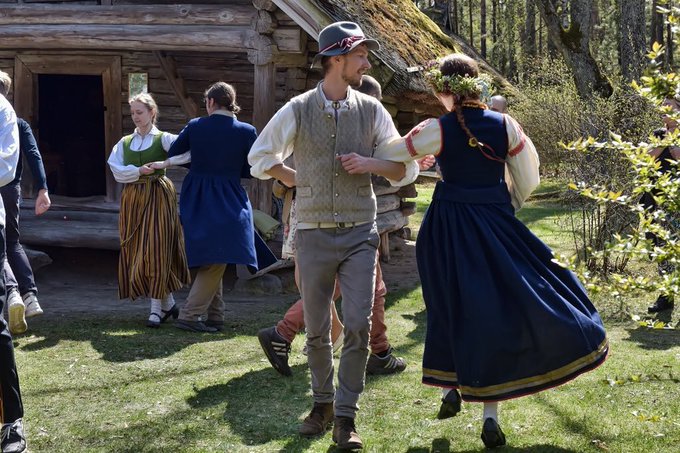Click here
Moreover, there are Germans, such as Hermann Rauschning, the author of the book Hitler Told Me, who withdrew from the Movement as soon as they realised the pagan character of Hitler’s worldview. And it should be noted that they only realised this when they had gained the Führer’s trust sufficiently for him to admit them into his small circle of insiders or partially insiders.
For there was a difference between the teaching given to the people in general and that received by the disciples: a difference not of content but of clarity. For example, Point 24 of the famous Twenty-Five Points specifies that the Party, while proclaiming the widest religious tolerance, holds to a ‘positive Christianity’—in other words, to what is positive, i.e., true per tradition in historical Christianity—but that it fights any religion or philosophy that ‘endanger its existence or oppose the moral senses of the Germanic race.’[1]
It omits (no doubt on purpose) to point out that any religion which turns its back on the realities of this world and in particular on biological realities—to the extent of permitting the marriage of people of different races provided they are members of the same church—is a danger in the National Socialist State.
In Mein Kampf, the Führer denies that he is in the least aiming at religious reform. ‘It is criminal,’ he writes, ‘to attempt to destroy the faith accepted by the people, as long as there is nothing to replace it.’[2] He writes further that the mission of the National Socialist Movement ‘doesn’t consist of religious reform but the political reorganisation of the German people.’[3]
But what he doesn’t write—what he couldn’t write in a book intended for the great mass of a people Christianised since the 9th century—is that any regime based, as the National Socialist regime was, on the denial of the intrinsic worth of every man, is the antithesis of a Christian social order. What Adolf Hitler couldn’t tell the masses was that any political regime based on a doctrine centred on Life and its eternal laws necessarily has a more-than-political significance. On the voice of the great mass depended his success, for we must not forget that he reached power legally and democratically.
This more-than-political significance of Hitlerism was fully understood only by the Führer himself and the National Socialist elite in Germany: the initiates and best pupils of the Ordensburgen (castles/fortresses of military orders) where the members of the SS were trained. The mass of the people didn’t feel it, and would have been quite surprised if someone had shown them the implications; for example, Christianity and Hitlerism are two different and incompatible paths to the eternal and the same person cannot follow both but must choose.
Outside Germany—and outside India, of Aryan tradition—a thinking elite loved, feared or hated Hitlerism because of its true nature. The Jewish elite cursed it for reasons deeper than the age-old hostility between Israel and the Germanic world. The enormous human masses in all countries—indifferent to politics—feared it without knowing exactly why. In reality, they hated it because they vaguely felt in it the negation of all anthropocentrism, the ‘wisdom of starry space’ as I have called it as opposed to the ‘love of man’ and the concern for his happiness in this world or any other.
___________
[1] ‘We demand freedom of religion for all religious denominations within the state so long as they do not endanger its existence or oppose the moral senses of the Germanic race. The Party as such advocates the standpoint of a positive Christianity without binding itself confessionally to any one denomination. It combats the Jewish-materialistic spirit within and around us, and is convinced that a lasting recovery of our nation can only succeed from within on the framework: common utility precedes individual utility.’
[2] Mein Kampf German edition 1935, pages 293-294.
[3] Ibid, p. 379.
Evropa Soberana, backup 34
Click here
Translation of the first paragraphs:
‘Indefinite progress’ is an idea of enlightenment origin, which was born in the Near East with civilisation itself and procured theoretical-rational legitimacy during the French Enlightenment of the 18th century. It is based on the notion that human beings come from a sick, dirty, ignorant and primitive past, and that they are gradually moving towards a healthy, clean, cultured and ‘advanced’ future. Archaeology suggests rather the opposite, namely that civilisation has caused human beings to fall from a state of grace, making them sick.
The idea of religious traditions was similar: there was an Edenic ‘golden age’ (Satya or Krita Yuga for the Hindus) in which mankind was most perfect, and after which a trauma came that caused human degeneration and the appearance of misery and disease, culminating in the Iron Age (Kali Yuga for the Hindus). Despite this, the industrial spiral into which we are plunged continues to propagate that infinite economic growth is viable, that the tower of Babel can go up indefinitely, that things are getting better and, in short, that human beings have ‘improved’.
Kedareshwar Cave Temple is located at Harishchandragad, a hill fort in Ahmednagar district. Though there were four pillars surrounding the Linga, now there is only one pillar intact. Some believe the pillars to be symbols of yuga or time, namely, Satya, Treta, Dvapara and the Kali Yuga.
Evropa Soberana, backup 33
Click here
Evropa Soberana, backup 32
Click here
This is my rewritten foreword to Savitri’s
book which I am still proofreading:
Editor’s preface
On the featured page of my website The West’s Darkest Hour you can see a list of recommended readings. But Hellstorm and The Fair Race are only the first stepping stones for the normie who has already dipped his feet in the psychological Rubicon. Now, thanks to this last stepping stone, he can finish crossing the river.
Memories and Reflections of an Aryan Woman (original in French: Souvenirs et Réflexions d’une Aryenne) is probably the only readable book that introduces the initiate to the spirit of National Socialism. Mein Kampf is not a good introduction for the simple fact that Adolf Hitler had to hide his anti-Christian sentiments from the masses of Germans, as demonstrated by Richard Weikart in Hitler’s Religion. It would have been unwise, in the 1920s and 30s, to spread openly and unabashedly the Führer’s anti-Christianity without the proper psychological preparation of the German people.
Apart from the fact that hostility to Christianity, central to Hitler’s pantheist religion, is only barely glimpsed in the public-relations book titled Mein Kampf, other writers helped Hitler to redact it converting it into a long-winded book. That is why David Irving, the most authoritative historian of Hitler and the Third Reich, did not even read Mein Kampf: it was unclear which passages were authored by Hitler himself and which by his assistants.
But there is a deeper reason why anyone wishing to be introduced to National Socialism should not begin his intellectual journey with Mein Kampf. The catastrophe that befell the entire white race after 1945 is of such astronomical proportions that to understand the Religion of the Strong one must begin with a text written after that year. More to the point, Mein Kampf omitted to discuss the extermination of non-whites around the globe. It wasn’t politically correct to talk about final solutions to naïve Germans who still obeyed New Testament mandates, the word of the god of the Jews. Hitler didn’t develop the exterminationist hatred that we now feel for the simple fact that he ignored what would happen to the fair race if he lost the war. In a nutshell, Mein Kampf is for the normies of a bygone era: not for those of us living in the blackest hour of all history.
There is something else. ‘Numinous’ is a term derived from the Latin numen meaning arousing mysterious or awe-inspiring emotion. Once one strips National Socialism of all reticence to talk openly against Christianity, NS is incredibly fascinating and deserves an introductory book reflecting its intrinsic numinousness. And only Savitri Devi delved into the heart of a post-1945 NS that, if interpreted through numinous music, could be captured by Wagner’s Götterdämmerung. In no other book can we grasp Hitler’s true religion as in Memories and Reflections. Not even in Savitri’s The Lightning and the Sun since it opens with two chapters on historical figures who have nothing to do with the ideals of the German Reich. She published Memories and Reflections seventeen years after The Lightning and the Sun, when her thought had already reached full philosophical maturity.
On a personal note, this book saved me from my solitude. It is amazing how the final two chapters portray my exterminationist passion as if I had written them myself.[1] Even before I read Memories and Reflections I was, like Savitri, a member of what she calls in her first chapter ‘the Religion of the Strong.’ All the criticism Savitri makes of anthropocentrism I knew decades before I read this very book, through intimate soliloquies that I could share with no one. And her concept of a ‘man against Time’ made me understand myself for the first time in my life.
Quite a few passages of this book describe me so perfectly that the idea crossed my mind to insert here a photograph of me taken from afar during one of my countless daily walks, immersed in my thoughts and without any friends in the metropolis of over twenty million people where I live, to the extent of not owning a mobile phone due to my absolute alienation in a world that, by repudiating Hitler, chose Hell. The good news is that, as I was born in 1958, learning that I had shared twenty-four years of life with Savitri Devi (1905-1982), even though I never met her and we were living on different continents, brought me out of my existential solitude. So in honour of what Savitri tells us here about the Hindu archetype Kalki I have added a subtitle to The West’s Darkest Hour: ‘Kalki’s apprentice website.’
The inescapable question arises: Why, after Savitri, has no man or woman written anything like this book? The answer is devastatingly simple: because the Aryan spirit was completely and overwhelmingly crushed after 1945. As American neo-Nazi James Mason put it during an interview with white supremacist Tom Metzger, ‘With the death of Adolf Hitler in the close of the Second World War in 1945 Western civilization, as it had existed and is still perceived, DIED [emphasis in Mason’s voice] once and for all. The only thing that was left now was a gene pool,’ referring to whites. And the saddest thing is that this greatest crime of all history was perpetrated by those whites who destroyed Hitler’s Reich.
I ignore whether this abridged translation (the sentences of Savitri’s original text were too long) will do any or no good at all in resurrecting the Aryan spirit. For the time being I can only confess that all the illustrations in this abridged translation were inserted by me.
César Tort
February 2023
____________
[1] See also El Grial: the third book of my autobiographical trilogy that is still untranslated into English.
Evropa Soberana, backup 31
Click here
Ritter is an idiot
The Wikipedia article on Scott Ritter has him as an American author, former US Marine Corps intelligence officer and former UN Special Commission weapons inspector. In my last few posts I have passed the microphone to him only because his view of the Ukrainian war differs completely from the lies of the MSM. But Ritter is an absolute idiot when it comes to the Third Reich.
In the first forty minutes of this long interview, the Gentile Ritter utters the most vociferous propaganda against Hitler’s Germany as no Jew could, which ratifies my opinion that a misinformed white is far more dangerous than a malicious kike.
The fact that in the previous few days I have passed the mic to Ritter on the Ukrainian issue teaches me a lesson. I must never again take seriously vloggers who aren’t strictly National Socialists. If I did so, it was only because I am disgusted by Western propaganda on Ukraine, which includes what the MSM has been saying for a year in Spanish, both in Latin America and in Spain. While it is refreshing to hear a dissenting voice from the accepted wisdom on Ukraine, when we scratch the surface of that apparent dissenter, we find a normie who is playing a negative role in the darkest hour for the fair race.
In the video linked above Ritter talks about the so-called holocaust but in the 40 minutes I watched he fails to mention the figure of the tens of millions killed by Lenin and Stalin’s willing executioners (many of these executioners were Jews).[*] Ritter is probably not even familiar with Solzhenitsyn’s 200 Years Together. And let’s not talk about Goodrich’s Hellstorm and other books that mention Dwight Eisenhower’s death camps (remember: millions of unarmed Germans were holocausted between 1945 and 1947).
So that this doesn’t happen to me again, I will never listen to YouTube normies again. Now that I am about to start the last proofreading of Savitri’s book, I’d better be adding here some quotes from her that I found remarkable.
__________
[*] Always keep in mind the words of Jewish scholar Ron Unz referring to the Gulag:
‘In per capita terms Jews were the greatest mass-murderers of the twentieth century, holding that unfortunate distinction by an enormous margin and with no other nationality coming even remotely close. And yet, by the astonishing alchemy of Hollywood, the greatest killers of the last one hundred years have somehow been transmuted into being seen as the greatest victims, a transformation so seemingly implausible that future generations will surely be left gasping in awe’.
Read also An Eye for an Eye: The Untold Story of Jewish Revenge Against Germans by another Jew, John Sack.





